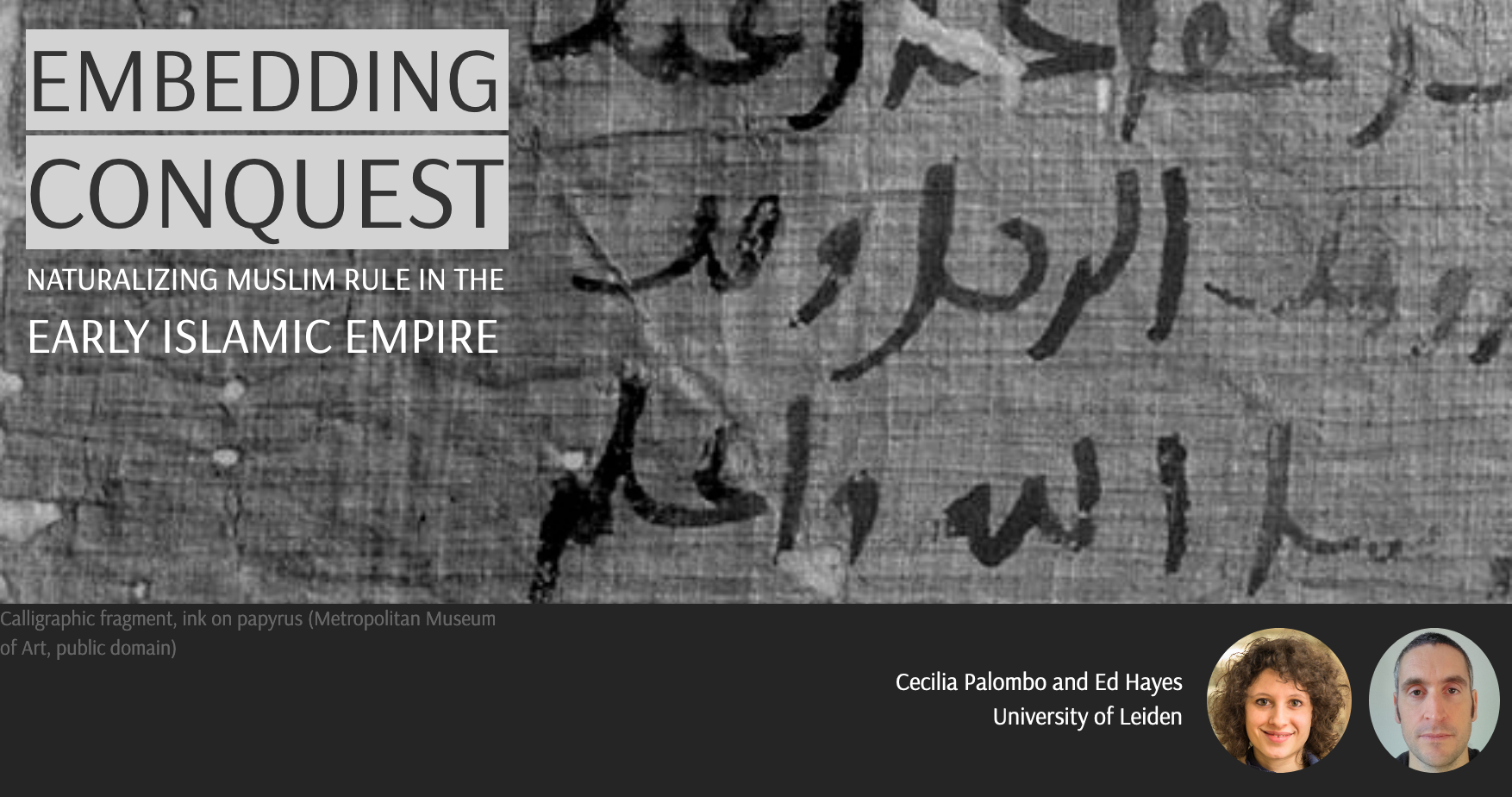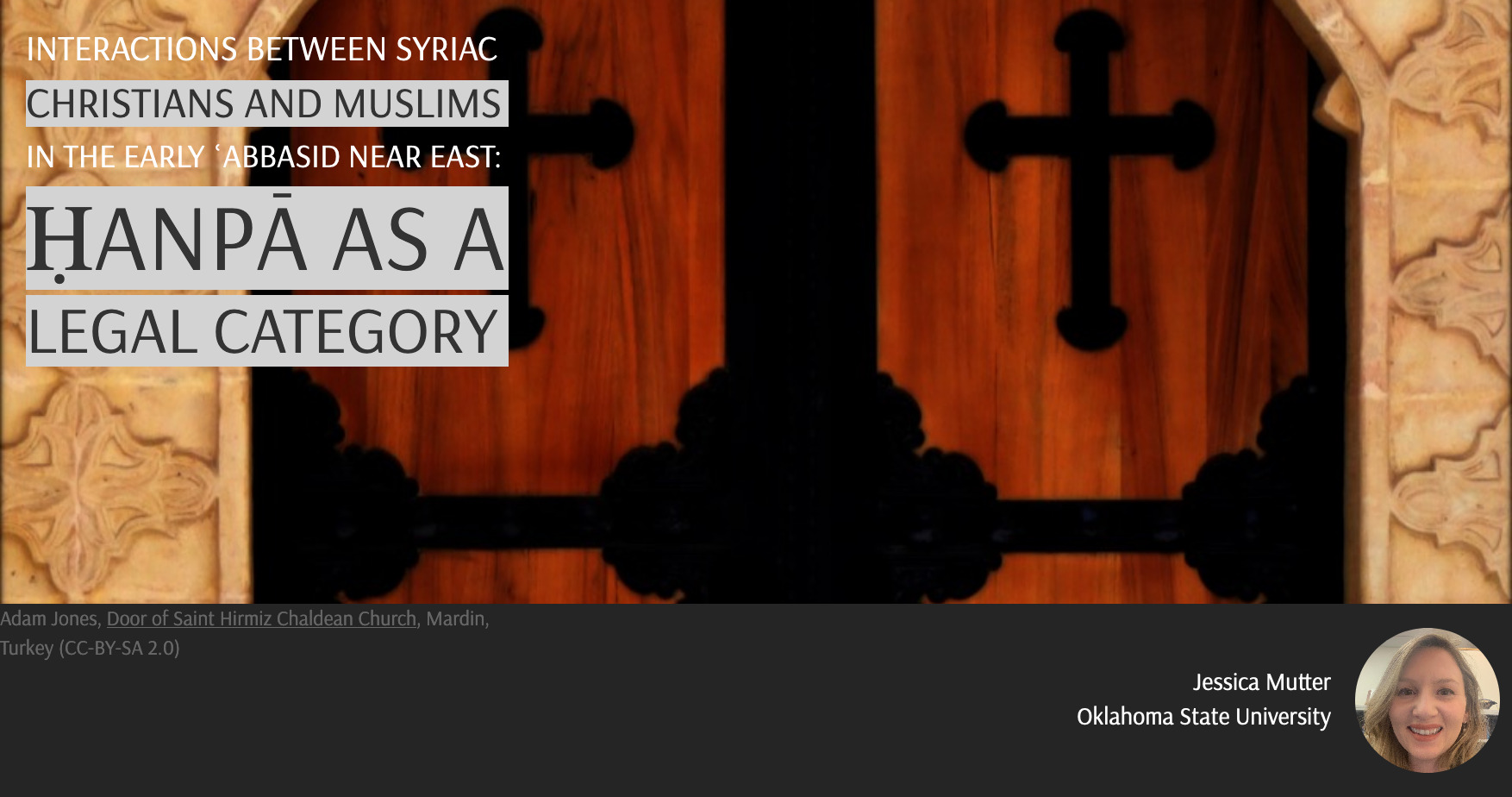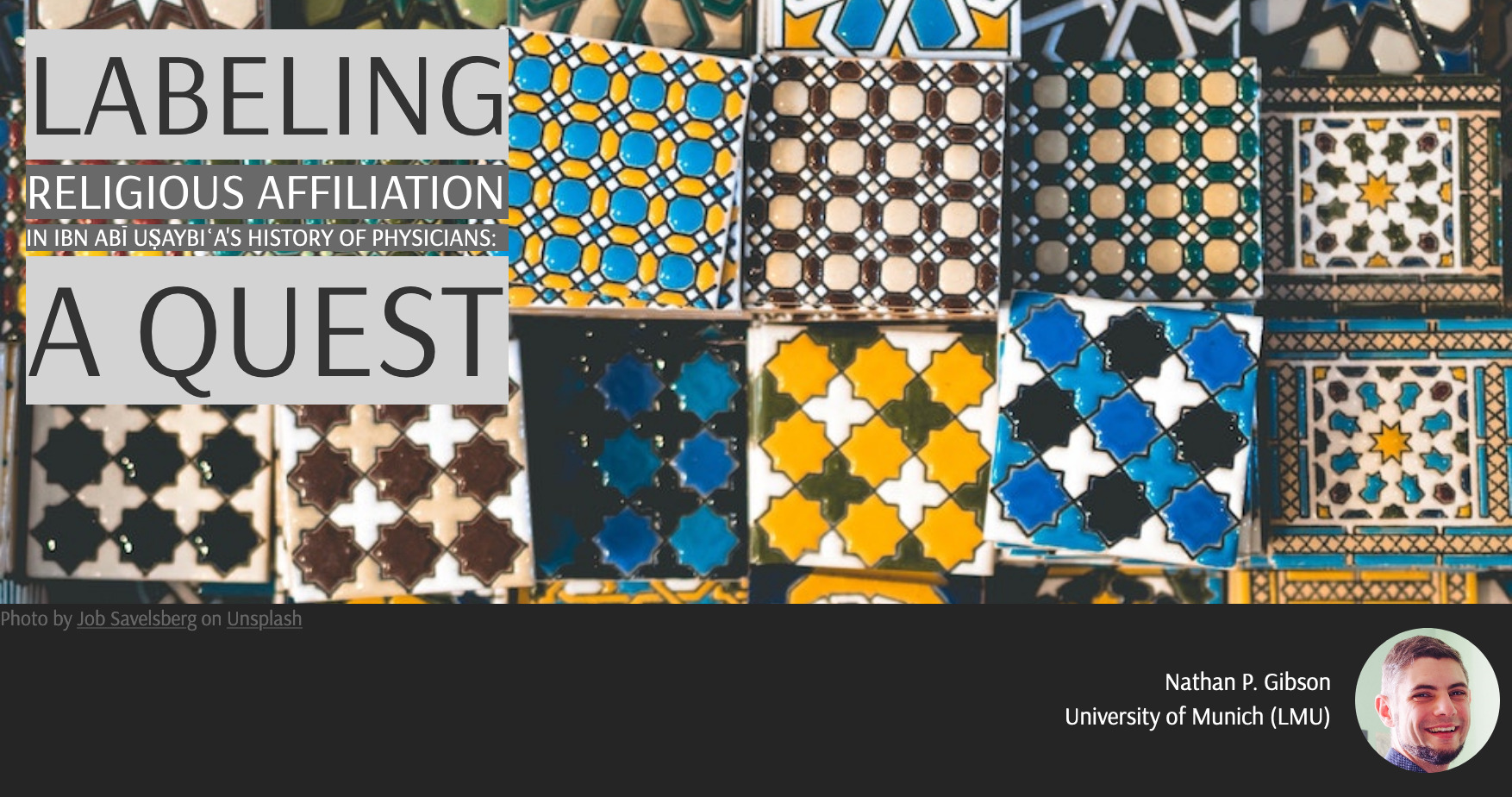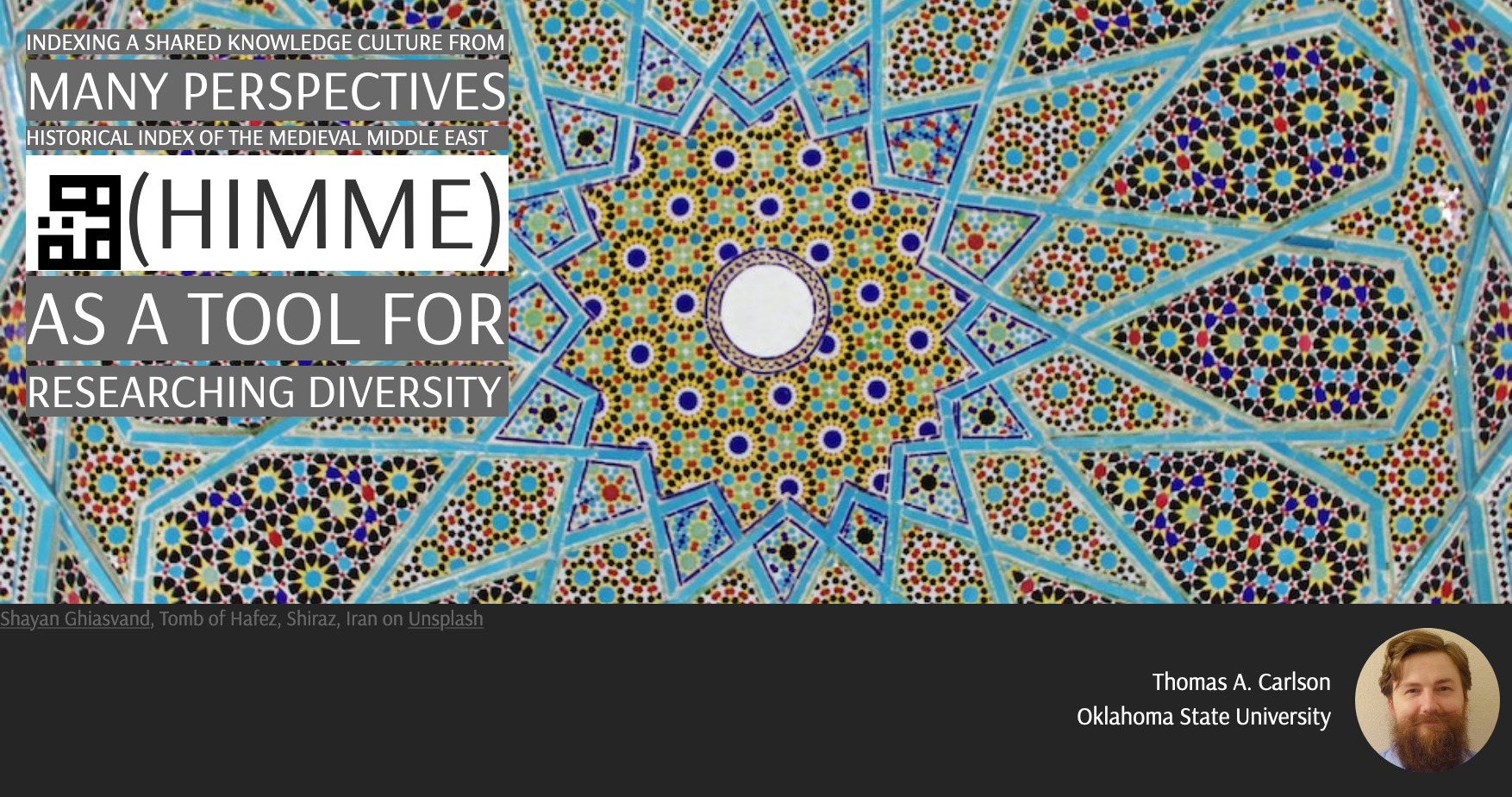Email 1 (@MalindaT)
Subject: Tuesday Virtual Forum: Embedding Conquest and Hanpa as Legal Category
Dear All,
It's our last two sessions! You're invited to register for this Tuesday's (Dec. 8) project demo by Cecilia Palombo and Ed Hayes ("Embedding Conquest") and the research paper discussion by Jessica Mutter ("Ḥanpā as a Legal Category").
Also, note our final session this coming Friday (Dec. 11), with a research paper discussion by yours truly (Nathan Gibson, "Labeling Religious Affiliation") and a project demo by Thomas Carlson ("HIMME: Historical Index of the Medieval Middle East"). See details at https://usaybia.net/forum2020.

Tuesday, December 8
16:00 Project Demo
Embedding Conquest: Naturalizing Muslim Rule in the Early Islamic Empire
Event info and registration: https://usaybia.net/forum2020#15-hayes
Cecilia Palombo and Ed Hayes University of Leiden
The 7th-century Arab Muslim conquests changed the socio-political configurations in the Mediterranean and Eurasia forever. Yet we do not really know how the Arabs managed to gain dominance of this vast, ethnically, religiously and linguistically diverse area which had its own, long imperial traditions, and to make this a sustainable enterprise. What built the empire, and what held it together?
“Embedding Conquest” investigates the mechanics and structures of social, economic and personal dependency that tied the diverse regions of the early Islamic empire together, from the Nile Delta to the Hindu Kush. We approach this broad question as a team by examining a vast corpus of documentary letters written on papyrus, paper, potsherds, and other materials, as well as letters reproduced in literary sources. In our demo, we will present some of our most salient preliminary findings. We will focus on the elements of our research that best highlight the coparticipation of religious leaders and religious agents from different groups, environments, and communities.
The project studies the mechanics of Islamic rule through three main areas: the language of social dependency expressed, in particular, in letters of request; the relationship between central and provincial governorship; and the role of local elites as well as actors at the fringes of government, such as religious scholars, among others. Our research is comparative, as it embraces local realities in different regions and looks at a variety of groups, not to mention sources in several languages and scripts; attentive to trends and trajectories, as it covers over three centuries; and innovative, as it is based on most recent findings in papyrology and archaeology, combining them with new perspectives in Middle East history. For the virtual forum on “Jews, Christians, and Muslims as Colleagues and Collaborators in the Abbasid Near East” we would like to briefly present the research of two team members in particular, the project's postdoctoral fellows Ed Hayes and Cecilia Palombo, who have been working on the intersection of religious leadership and political governance. Ed Hayes' research focuses on the history of early Imami Shi'i communities and on the relationship between fiscal policy and religious protest. Cecilia Palombo's research, on the other hand, looks at the development of localized forms of Islamic governance through the involvement of Christian religious leaders, such as monastic headmen.
We hope to take the opportunity of this Forum for sharing some of our insights concerning the role of religious leaders from different communities in shaping and establishing early Islamic rule; and concerning the way in which those leaders' political activities, at the same time, contributed to shape religious knowledge and experience.
Cecilia Palombo is a postdoc in the ERC project “Embedding Conquest: Naturalizing Muslim Rule in the Early Islamic Empire.” She works on the social and political history of the pre-Ottoman Middle East and on its documentary cultures.
Edmund Hayes is a postdoctoral researcher at the University of Leiden. He works on early Islam, focusing on the intersection of religious, intellectual and social history.

Tuesday, December 8
16:30 Paper Discussion
Interactions between Syriac Christians and Muslims in the Early ʿAbbasid Near East: Ḥanpā as a Legal Category
Event info and registration: https://usaybia.net/forum2020#16-mutter
Jessica Mutter Oklahoma State University
The term ḥanpā (pl. ḥanpē), Syriac ‘pagan,’ was used by Syriac Christian scholars to denote a variety of non-Christian religious communities and was one of the first Syriac terms used to refer to Muslims. While other Syriac terms came into use to denote Muslims over the course of the seventh and eighth centuries, C.E., ḥanpā remained common well into the ʿAbbasid period, especially in legal writing. This paper focuses on the use of ḥanpā/ḥanpē in Syriac Christian legal writing in the early ʿAbbasid period to signify Muslims.
In this paper, I argue that, when used in Syriac Christian legal texts, the term ḥanpā should be viewed as a legal category, one that very much included Muslims. In this context, a ḥanpā is essentially an outsider who may still interact with Syriac Christian individuals and communities, but in an increasingly regulated way that is meant to protect Syriac Christian communities from loss of constituents (presumably to conversion to Islam) or the blurring of boundaries between Muslim and Christian beliefs and practices. For example, marrying one’s daughter to a pagan was condemned in the canons of George I of Antioch (d. 790 C.E.), and marrying a daughter to a ḥanpā barred father and daughter from entering the church. It is clear this ruling included Muslim men, or perhaps was specifically meant for them. In contrast, earlier Syriac Christian leaders such as Jacob of Edessa (d. 708 C.E.) allowed Christian women who married Muslim men to continue taking communion, on grounds that not allowing them to do so would encourage conversion to Islam. Use of ḥanpā to describe Muslims in the early ʿAbbasid era suggests an attempt to regulate interactions with Muslims, with a particular emphasis on marriage, conversion, and social interactions.
Jessica Mutter is a postdoctoral researcher in medieval Middle Eastern History at Oklahoma State University, where she is working on the Historical Index of the Medieval Middle East, a multilingual digital history project led by Thomas Carlson and funded by the NEH.
How it works
The virtual forum is conceived as an opportunity to discuss the state of research on interreligious knowledge exchange. Half-hour project demos will showcase ongoing projects in the area, while one-hour research paper discussions are a chance to interact on a deeper level with researchers who are in the process of formulating approaches to the subject.
- Students, academics, and anyone else interested may register by clicking on any of the registration links. This will take you to a Zoom page, where you can select any or all of the nine sessions to attend virtually. The number of Zoom participants for each session is limited to 100.
- Registered participants will be sent drafts of research papers to read and comment on ahead of time. We'll use the web tool Hypothes.is to do this collaboratively. You can get a free Hypothes.is account here, and you'll receive an email ahead of the session containing a link to read the paper and another link to join the private Hypothes.is group where you can comment or ask questions.
- During the live Zoom sessions, you'll hear two presentations and, for research paper discussions, 1–2 responses from invited participants. The remainder of the time will be open for you to interact with the speaker, so come with questions!
- Proceedings: Revised papers from the forum will be submitted to a special issue of medieval worlds: comparative & interdisciplinary studies, a peer-reviewed, open-access journal published by the Austrian Academy of Sciences (ISSN 2412-3196).
All times are Central European Time (CET). Logistical support has been provided by Usaybia.net team members Vanessa Birkhahn and Malinda Tolay.
Background
From the eighth century to the thirteenth century and beyond, scholars in the Abbasid and neighboring realms pioneered study in medicine, mathematics, the astral arts, and many other disciplines. Scholarly treatises from that era together with biographical sources such as Ibn Abī Uṣaybiʿa's History of Physicians and documentary texts from the Cairo Genizah show that this scholarly activity was not isolated to a single community. Instead, it emerged from a rich exchange between scholars affiliated with many different communities: Jewish, Christian, Muslim, Zoroastrian, Hindu, Samaritan, and others. Sometimes this exchange occurred through books or letters while at other times it was face-to-face in formal, institutional settings, side-by-side in the workplace, or even mediated through patrons, servants, or family members.
In the framework of the project “Communities of Knowledge” (funded by the German Federal Ministry of Education and Research), we are hosting a series of discussions on the topic of person-to-person knowledge exchange among Near Eastern communities during Abbasid rule.
All best,
(on behalf of) Nathan Gibson
Nathan P. Gibson, Ph.D. Principal Investigator, Communities of Knowledge/Wissensgemeinschaften (usaybia.net) Ludwig-Maximilians-Universität München Institut für den Nahen und Mittleren Osten
Associated Projects: Syriaca.org, Biblia Arabica


Two weeks before
5.12.
Event Management
Publicity
Mailing Lists Email 1
Posts
8.12.
9.12.
Posts
Mailing Lists Email 2
Event Management
11.12.
14.12.
During event
Moderation (@vanessa612, @MalindaT)
Timeline 8.12.
15:50 meet & greet 16:00 forum introduction, Zoom tips (send chat message), introduce presenter 16:05 project demo 16:20 Q&A 16:25 feedback poll 16:30 introduce presenter 16:35 presentation 16:50 response 16:55 follow-up 17:00 general discussion 17:25 feedback poll
Timeline 11.12.
15:50 meet & greet 16:00 forum introduction, Zoom tips (send chat message), introduce presenter 16:05 presentation 1 16:20 response 16:25 follow-up 16:30 general discussion 16:55 feedback poll 17:00 introduce presenter 17:05 presentation 2 17:20 response 17:25 follow-up 17:30 general discussion 17:55 feedback poll
Links